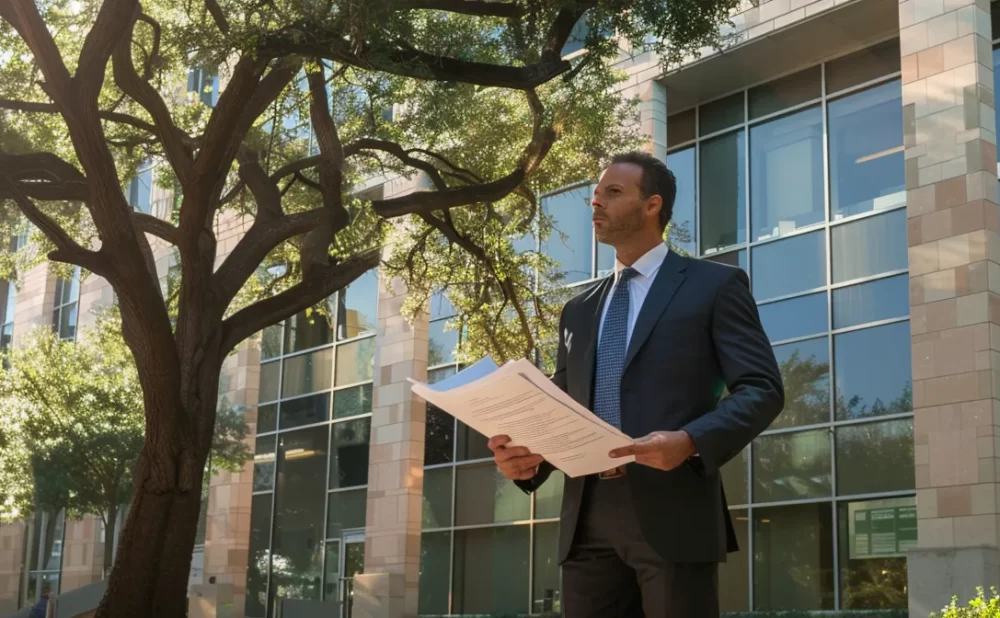Have you or a loved one been harmed due to someone else’s negligence in Texas? Navigating the aftermath of a Personal Injury Lawsuit in Texas can be overwhelming. This article will guide you through the essential steps to maximize your chances of a successful outcome. Learn how to recognize your legal rights, understand the importance of timely medical documentation, and discover the necessity of expert legal counsel. We’ll cover how to effectively gather evidence, meet critical deadlines, and prepare for potential settlement discussions or court proceedings. For those seeking personal injury services, a visit to Heil Law Firm can provide the support needed to navigate these complex waters. Contact us to ensure your personal injury lawsuit is handled with the expertise it deserves.
Key Takeaways
- Understanding Texas personal injury law is crucial for effective legal action
- Proper documentation and adherence to medical advice are key in personal injury claims
- Timely action is essential due to the statute of limitations in personal injury cases
- Expert legal representation significantly impacts the outcome of personal injury lawsuits
- Alternative dispute resolutions can expedite settlements and reduce court time
Understand Your Legal Rights After a Personal Injury in Texas

When a personal injury occurs in Texas, understanding one’s legal rights is paramount. The plaintiff must be well-informed about the state’s personal injury laws that may affect their case, including the ability to sue for emotional distress. Identifying the parties liable for the injuries is a critical step, as is determining the potential compensation one may be entitled to. An experienced lawyer can serve as a powerful advocate, guiding individuals through these complex personal injury services processes to ensure their rights are protected and their case is effectively presented. contact us.
Review Texas Personal Injury Laws Affecting Your Case
In the realm of Texas personal injury law, the concept of ‘duty of care’ is foundational. This legal obligation requires individuals and entities to act with a certain level of caution and consideration to avoid causing harm to others. When this duty is breached, resulting in injury, the injured party has the right to seek compensation. A seasoned attorney can assist in proving this breach and the extent of the damages incurred, which is a crucial aspect of building a strong case. For more information, Visit Heil Law Firm or contact us about our personal injury services.
Understanding the nuances of ‘class action’ suits and ‘motion’ procedures is also vital for Texas personal injury claimants. A class action allows a group of individuals who have suffered similar harm to file a lawsuit collectively, which can be an efficient way to handle widespread issues. On the other hand, motions are formal requests made to the court, often used to challenge or advance legal proceedings. Knowledge of these legal mechanisms can significantly impact the strategy and outcome of a personal injury case:
| Legal Term | Definition | Relevance to Personal Injury |
|---|---|---|
| Duty of Care | An obligation to avoid causing harm | Central to establishing liability |
| Class Action | A lawsuit filed by a group of people with similar injuries | Useful for cases with many affected parties |
| Motion | A formal request to the court in a lawsuit | Can expedite or alter the course of litigation |
Identify Parties Liable for Your Injuries
In the aftermath of accidents, pinpointing the responsible parties is a crucial step in the pursuit of justice and compensation. An attorney specializing in personal injury cases will meticulously examine the details of the incident to establish causation and liability. In Dallas, for instance, the complexity of urban traffic can lead to multi-party accountability, where both individuals and entities may bear responsibility for the damages suffered by the plaintiff.
Once they establish liability, they focus on quantifying damages, which includes both economic and non-economic losses. The attorney meticulously calculates all damages, including medical expenses, lost wages, and pain and suffering, ensuring clients receive the full compensation they deserve under Texas law.
Determine Potential Compensation You May Be Entitled To
Calculating potential compensation is a critical step for individuals in San Antonio and beyond who have suffered personal injuries. This process involves a thorough assessment of the physical, emotional, and financial impact of the injury. Compensation may cover medical bills, therapy costs, lost income, and other expenses incurred. In cases of premises liability, where an injury occurs on someone else’s property due to negligence, the victim may also be entitled to compensation for ongoing rehabilitation or disability.
During the negotiation phase, an attorney’s expertise becomes invaluable, particularly when dealing with insurance companies and opposing counsel. The goal is to reach a fair judgment that reflects the true extent of the damages. If the parties can’t reach a settlement, the case will proceed to trial, where a jury or judge will determine the compensation. The attorney presents a compelling case to maximize the client’s financial recovery and ensure justice.
| Aspect of Compensation | Details | Relevance to Client |
|---|---|---|
| Medical Expenses | Costs for immediate and ongoing medical care | Essential for covering health-related financial burdens |
| Lost Wages | Income lost due to inability to work | Compensates for financial stability during recovery |
| Pain and Suffering | Non-economic damages for physical and emotional distress | Acknowledges the intangible impact of the injury |
| Premises Liability | Injuries sustained on poorly maintained properties | Ensures accountability and promotes safer environments |
Seek Immediate Medical Attention and Document Injuries

After sustaining an injury, it is crucial to seek prompt medical attention to ensure a comprehensive examination by a healthcare professional. This initial step is not only vital for one’s health but also for substantiating a personal injury lawsuit in Texas. Keeping meticulous records of all medical treatments is equally important, as these documents serve as evidence of the injuries sustained and the treatments required. Adhering to medical advice is imperative for optimal recovery and can influence the jury’s perception of “pain and suffering” in the case. Whether the incident involves medical malpractice or a catastrophic injury, the guidance of a seasoned law firm can be instrumental in navigating these steps.
Visit a Doctor Promptly for a Thorough Examination
Immediately after an incident, individuals in Houston seeking to file a personal injury lawsuit should consult a healthcare provider for a detailed examination. This critical step not only ensures a proper assessment of any injuries, including potential disfigurement, but also creates a medical record that a personal lawsuit attorney can use to substantiate claims. Timely medical documentation is a cornerstone of a compelling closing argument, demonstrating the direct impact of the injury on the client’s life.
It is imperative for those affected to understand that the medical examination findings will serve as foundational evidence in their personal injury case in California or elsewhere. A thorough and prompt medical evaluation not only aids in recovery but also provides the attorney with concrete details to argue for rightful compensation. This approach underscores the severity of the injuries and the necessity for adequate restitution, which is essential in the pursuit of justice.
Keep Detailed Records of Medical Treatments Received
Documenting every aspect of medical care received is a critical component of a personal injury claim in Texas. This includes keeping a detailed log of all hospital visits, treatments, medications, and any out-of-pocket expenses incurred. These records not only substantiate the financial impact of the injury but also reinforce the plaintiff’s rights under personal injury law. Precise documentation can prove invaluable when establishing the extent of damages in a strict liability case.
For individuals navigating the complexities of personal injury law, maintaining comprehensive records offers a clear depiction of the injury’s aftermath: the medical interventions, the recovery timeline, and the associated costs. This level of detail supports the injury claim, providing tangible evidence of the expenses and the ongoing impact on the plaintiff’s life. The following table illustrates the types of records and their relevance to a personal injury lawsuit:
| Type of Record | Description | Relevance to Injury Claim |
|---|---|---|
| Medical Reports | Detailed accounts of injuries and treatments | Essential for demonstrating the severity of injuries |
| Expense Receipts | Proof of medical and related costs | Crucial for calculating compensation |
| Treatment Timeline | Chronology of medical care and recovery | Helps establish the duration of the injury’s impact |
Follow All Medical Advice for Optimal Recovery
Adherence to medical advice is a cornerstone of recovery and a pivotal element in the pursuit of personal injury damages. For those who intend to sue for a car accident or file a wrongful death claim, compliance with treatment plans and physician recommendations can significantly influence the outcome of a settlement. It demonstrates to the court the extent of the injury and the plaintiff’s commitment to regaining their health, which can be a compelling factor in the adjudication of damages.
Moreover, the plaintiff’s dedication to following medical guidance can mitigate the risk of exacerbating the injury, which is crucial when property damage or personal harm is involved. This commitment is not only beneficial for the individual’s health but also serves as a testament to the severity of the incident in legal proceedings. The following table illustrates the relationship between medical adherence and personal injury claims:
| Medical Adherence | Impact on Recovery | Relevance to Personal Injury Claim |
|---|---|---|
| Following Treatment Plans | Enhances healing and reduces complications | Strengthens the case for claiming comprehensive damages |
| Documenting Progress | Provides a clear recovery timeline | Supports the narrative of sustained effort and impact |
| Attending Follow-up Visits | Ensures ongoing assessment and adjustment of care | Reflects due diligence, potentially affecting settlement amounts |
Consult an Experienced Personal Injury Attorney in Texas

Embarking on a personal injury lawsuit in Texas necessitates the guidance of a skilled attorney. Individuals should commence by researching qualified personal injury lawyers in their area, ensuring they select a representative well-versed in cases like theirs. Scheduling a consultation is a critical next step to discuss legal options and gain clarity on the cause of action. Understand the legal fees and agreements, including the percentage owed for services, before proceeding. These preliminary actions lay the groundwork for a well-informed legal journey.
Research Qualified Personal Injury Lawyers in Your Area
Embarking on the search for a qualified personal injury lawyer in Texas is a strategic move that can significantly influence the outcome of a lawsuit. Clients should prioritize attorneys with a proven track record in handling cases involving negligence, as their expertise can be pivotal in drafting a compelling demand letter and navigating the complexities of mediation or arbitration. The right lawyer will not only aim to secure the maximum amount of money in compensation but will also provide the support and guidance needed throughout the legal process.
When evaluating potential legal representatives, it is essential to consider their experience with the specific type of personal injury case at hand. A lawyer’s successful history in similar cases can offer valuable insights into their ability to effectively manage and negotiate settlements. Clients should seek out attorneys who are adept at crafting a robust case strategy, from the initial consultation to the final resolution, ensuring their rights and financial interests are vigorously defended:
- Examine the attorney’s track record with personal injury cases, particularly those similar to your own.
- Assess their expertise in drafting demand letters and negotiating settlements.
- Confirm their willingness to pursue mediation or arbitration if it aligns with the client’s best interests.
Schedule a Consultation to Discuss Your Legal Options
Scheduling a consultation with a seasoned personal injury attorney is a decisive step towards achieving justice in the Texas courtroom. This initial meeting allows individuals to present their case, including any evidence of tort, and receive an expert’s opening statement on the legal strategies that may be employed. It is during this consultation that the attorney will assess the merits of the case, outline the policy surrounding personal injury claims, and set realistic expectations for the client.
In this crucial dialogue, the attorney will elucidate the complexities of the legal process, from filing the lawsuit to navigating the courtroom dynamics. The goal is to arm clients with the knowledge they need to make informed decisions about their pursuit of compensation. By understanding the intricacies of the legal system, including the nuances of presenting an opening statement and the procedural tactics used in the courtroom, clients are better prepared to collaborate with their attorney in seeking the justice they deserve.
Understand Legal Fees and Agreements Before Proceeding
Before embarking on a bodily injury claim in Texas, it is essential for clients to understand the legal fees and agreements involved in pursuing a lawsuit. A transparent discussion with a personal injury attorney will clarify the cost structure, which may include contingency fees, meaning the lawyer’s payment is contingent upon winning the case. This financial arrangement allows clients to proceed without upfront costs, aligning the attorney’s incentives with the client’s success.
Moreover, comprehending the scope of representation is crucial, especially when the lawsuit involves complex scenarios such as whiplash from a motorcycle accident or testimony from a witness. The attorney should provide a clear agreement that outlines the services offered, the stages of the legal process they will handle, and the communication protocols throughout the lawsuit. This ensures that both parties have a mutual understanding of the expectations and commitments:
| Fee Structure | Scope of Representation | Communication Protocols |
|---|---|---|
| Contingency fees and payment terms | Legal services included and stages covered | Methods and frequency of updates |
Gather and Preserve Evidence to Support Your Claim

Securing a favorable outcome in a personal injury lawsuit in Texas hinges on the ability to gather and preserve compelling evidence. This includes collecting accident reports and relevant documentation, which provide a factual basis for the claim. Additionally, securing photographs and videos of the accident scene can offer visual proof of the circumstances surrounding the incident. Obtaining witness statements and contact information is also crucial, as these accounts may support the plaintiff’s version of events. Each piece of evidence, from a deposition to a lien or documentation of disability, plays a pivotal role in building a robust case within the statute’s constraints.
Collect Accident Reports and Relevant Documentation
In the wake of a personal injury, promptly obtaining a medical record is a critical step for anyone involved in a car accident case in Texas. These documents not only provide a detailed account of the injuries sustained but also serve as a crucial piece of evidence when negotiating with claims adjusters or proving fault in court. It is imperative that individuals secure these records as they form the bedrock of a compelling legal argument.
As the law stipulates, preserving all relevant documentation is essential for substantiating a personal injury claim. This includes gathering any accident reports, which are often the first piece of evidence a claims adjuster will seek in a car accident case. The thoroughness and accuracy of this documentation can significantly influence the determination of fault and the subsequent compensation awarded:
- Secure a copy of the police report and any accident scene photos.
- Compile all medical records and bills related to the injury.
- Document any correspondence with insurance companies.
Secure Photographs and Videos of the Accident Scene
In the context of auto accident litigation or a slip and fall case, securing photographs and videos immediately after the incident can be pivotal. These visual records capture the scene in its unaltered state, providing irrefutable evidence that can support a legal case or even lead to punitive damages. They serve as a silent witness to the conditions that led to the injury, which can be instrumental when filing the initial complaint.
For individuals navigating the complexities of personal injury claims, the importance of visual evidence cannot be overstated. It offers a tangible depiction of the accident scene, which can corroborate testimony and challenge opposing narratives. This evidence is often critical in demonstrating liability and the extent of damages, thereby strengthening the plaintiff’s position in seeking just compensation:
- Photograph vehicle positions and damage in auto accidents.
- Capture images of hazardous conditions that caused a slip and fall.
- Record any visible injuries to document their severity.
- Use video to provide a dynamic perspective of the accident scene.
Obtain Witness Statements and Contact Information
Witness statements can be a linchpin in the success of an accident-related insurance claim or during dispute resolution proceedings. It is crucial for individuals to promptly obtain the contact information of anyone who witnessed the event. These firsthand accounts provide an objective perspective that can corroborate the victim’s narrative, particularly when liability is contested or the case progresses to trial.
In instances of product liability or other complex personal injury scenarios, witness testimonies can be pivotal in establishing the sequence of events leading to the injury. The legal team should work diligently to secure these statements early on, as memories can fade over time, potentially weakening the case. A clear, concise record of witness accounts often proves invaluable in clarifying the facts and fortifying the plaintiff’s position.
File Your Personal Injury Claim Within Texas Deadlines

Timeliness is critical when pursuing a personal injury lawsuit in Texas, especially following an injury claim car accident. Plaintiffs must be aware of the statute of limitations for their case to ensure they file within the jurisdiction’s deadlines. Completing and submitting all required legal documents is a meticulous process that demands attention to detail. Additionally, it is imperative to serve notice to all defendants involved properly, as this is a foundational step towards a potential car accident lawsuit settlement. These steps are essential for those seeking compensation for damages, including costs associated with surgery and other medical treatments.
Be Aware of the Statute of Limitations for Your Case
In Texas, the statute of limitations sets a deadline for filing a personal injury petition, typically two years from the date of the incident. This time constraint is crucial for plaintiffs, as it dictates the window within which they must initiate legal proceedings. Failure to file within this period could result in the loss of the right to seek compensation, regardless of the strength of the evidence or the credibility of testimony.
It is imperative for individuals involved in truck accidents or other personal injury cases to consult with a defense lawyer promptly to ensure timely filing. The attorney will help gather necessary evidence, secure testimony, and craft a compelling petition that adheres to Texas’s legal deadlines. Acting swiftly not only preserves the plaintiff’s legal rights but also ensures that critical evidence remains fresh and impactful.
Complete and Submit All Required Legal Documents
Adhering to the statute of limitations, individuals must meticulously prepare and submit all required legal documents to the appropriate entities, including the insurance company. This process often involves a detailed recount of suffering and pain, as well as a thorough presentation of evidence. The submission of these documents is a testament to the plaintiff’s resolve to seek justice and compensation for their injuries.
It is essential for plaintiffs to understand that each document, akin to a contract, must be completed with precision and accuracy to avoid any potential disputes or dismissals. The legal team plays a crucial role in this phase, ensuring that every form reflects the true extent of the client’s injuries and the impact on their life. This careful preparation can significantly influence the negotiations with the insurance company and the outcome of the claim.
Serve Notice to All Defendants Involved Properly
Properly serving notice to all defendants is a critical step in the initiation of a personal injury lawsuit in Texas. Whether the case involves a dog bite, assault, or another form of personal injury, the plaintiff must ensure that each defendant receives formal notification of the legal action being taken. This process, which legally informs the defendants of the complaint and their involvement in the case, allows them to respond within a specified timeframe and is a prerequisite for moving forward with alternative dispute resolution or court proceedings.
For plaintiffs, understanding the nuances of serving notice can impact the efficiency and fee structure of their case. It is essential to adhere to Texas’s procedural rules to avoid delays or dismissals that could jeopardize the lawsuit. A personal injury attorney can provide invaluable guidance, ensuring that all defendants, including individuals, businesses, or government entities, are notified correctly and promptly:
| Defendant Type | Service of Notice | Impact on Lawsuit |
|---|---|---|
| Individual | Personal delivery or certified mail | Ensures individual is aware and can prepare a defense |
| Business | Delivery to registered agent or company officer | Formalizes the legal process against the corporate entity |
| Government Entity | Specific procedures as outlined by law | Complies with sovereign immunity requirements |
Prepare for Settlement Discussions or Court Proceedings

As the personal injury lawsuit progresses in Texas, plaintiffs must prepare for the critical phase of settlement discussions or court proceedings. Evaluating settlement offers with an attorney’s guidance ensures that clients understand the terms and how they relate to their insurance policy and the damages incurred from a car accident. Participation in mediation or arbitration may offer alternative resolutions, while preparing for trial involves gathering necessary evidence, including documentation related to insurance and any applicable dram shop liabilities. This preparation is essential for a well-negotiated settlement or a successful court outcome.
Evaluate Settlement Offers With Your Attorney’s Guidance
When evaluating settlement offers, it is crucial for clients to consult with their attorney, who can provide a clear understanding of how the offer compares to the income lost and the severity of the gross negligence involved. The attorney’s expertise is vital in determining whether the payment proposed aligns with the anguish and suffering endured, ensuring that clients do not inadvertently accept a default judgment that undervalues their claim.
Attorneys adept in personal injury law will guide their clients through the intricacies of settlement negotiations, offering actionable insights to secure a fair resolution. They will assess the offer in the context of the client’s current and future financial needs, advising on whether to accept, negotiate, or proceed to trial. The following list outlines the steps an attorney may take when evaluating a settlement offer:
- Review the total amount offered in comparison to the damages suffered.
- Analyze the settlement terms to ensure they address all aspects of your claim.
- Advise the client on the potential outcomes of accepting the offer versus continuing to litigation.
Ultimately, the attorney’s guidance is instrumental in protecting the client’s interests and ensuring that any settlement offer adequately compensates for the hardships faced due to the personal injury.
Participate in Mediation or Arbitration if Applicable
Mediation or arbitration can serve as a pivotal juncture in a personal injury lawsuit in Texas, offering a path to resolution without the need for a court verdict. These alternative dispute resolution methods place the burden of proof in a less formal setting than a courtroom, allowing the parties to discuss the case before a neutral judge or arbitrator. The goal is to reach a summary judgment that satisfies everyone involved, potentially saving time and resources otherwise spent in court.
Engaging in mediation or arbitration requires a strategic approach, as the outcome can significantly affect the plaintiff’s compensation. An experienced attorney will guide their client through these proceedings, ensuring they present a strong case that clearly demonstrates the extent of their injuries and the associated damages. This process can alleviate the stress of a court trial and lead to a fair and expedient resolution, allowing the injured party to focus on recovery.
Get Ready for Trial by Gathering Necessary Evidence
As the personal injury lawsuit approaches trial, the plaintiff’s preparation becomes critical. Gathering necessary evidence is essential, particularly when the case involves complex issues such as car accidents or pain and suffering lawsuits. This evidence may include medical records, expert witness testimonies, and any documentation that establishes the defendant’s liability. The strength of this evidence can greatly influence the trial’s outcome and the potential for an appeal.
An expert witness plays a crucial role in strengthening a plaintiff’s case in a personal injury lawsuit. These professionals provide clarity on technical aspects that may be beyond the jury’s common knowledge, such as the long-term impact of injuries sustained in car accidents. Their testimony can be pivotal in quantifying pain and suffering, thereby supporting the plaintiff’s claim for just compensation:
- Secure expert witness testimonies to elucidate the extent of injuries.
- Compile a comprehensive dossier of medical records and bills.
- Document any loss of income or capacity resulting from the injury.
- Gather photographic or video evidence to reinforce the narrative of negligence.
Conclusion
Navigating a personal injury lawsuit in Texas requires a strategic approach, beginning with a thorough understanding of legal rights and the timely gathering of evidence. Consulting with an experienced attorney is crucial for interpreting complex laws, ensuring proper documentation, and adhering to critical deadlines. Effective preparation for settlement discussions or court proceedings can significantly influence the compensation received for damages. Ultimately, these key steps empower individuals to assert their rights and secure the justice they deserve following a personal injury.







